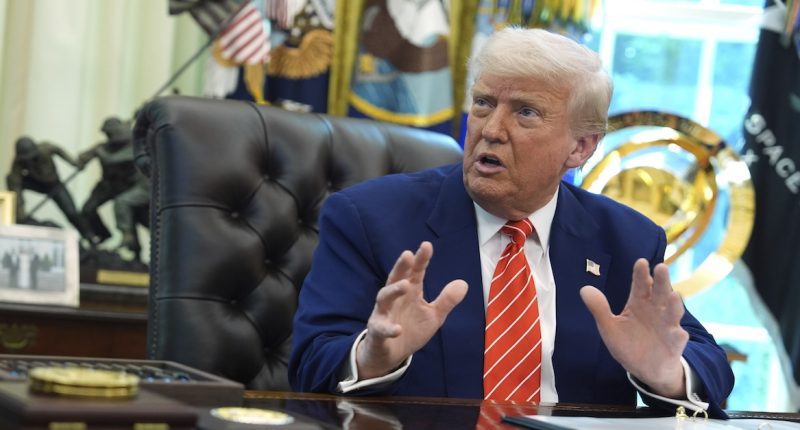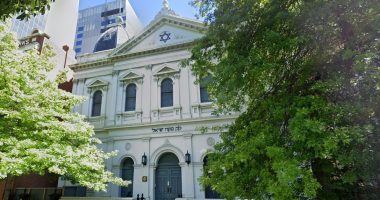Share this @internewscast.com
President Donald Trump addresses a joint press conference with Elon Musk in the Oval Office of the White House on Friday, May 30, 2025, in Washington (AP Photo/Evan Vucci).
Two mothers, an infant, and several nonprofit organizations are appealing to a federal court to prevent President Donald Trump from advancing his contentious plans to alter birthright citizenship.
On January 20, the 45th and 47th president enacted Executive Order 14160. This directive seeks to revise the constitutional interpretation, specifying that automatic citizenship will not be conferred on a child born in the United States to an undocumented mother — unless the father possesses some legal status.
The three Doe plaintiffs – one mother; one baby; one expectant mother – and OCA-Asian Pacific American Advocates, along with several other groups, sued in federal court days later. Their 32-page original petition, filed Jan. 30, alleges violations of federal law, the Fourteenth Amendment, and the Administrative Procedure Act (APA), the federal statute that governs the actions of administrative agencies. An amended complaint added additional constitutional and statutory claims.
On July 2, in a 55-page motion for partial summary judgment, the plaintiffs asked U.S. District Judge Timothy Kelly, a Trump appointee, to issue an injunction “preventing the enforcement” of the order.
Love true crime? Sign up for our newsletter, The Law&Crime Docket, to get the latest real-life crime stories delivered right to your inbox.
“Absent relief, Defendants” actions will cause grievous injury to Plaintiffs, whose citizenship or that of their children or their members’ children will be stripped,” the motion reads. “As the 249th anniversary of the Declaration of Independence approaches, this Court should exercise its power to declare the Defendants’ actions illegal and to enjoin their implementation.”
The plaintiffs are looking to short-circuit the litigation at the district court level by arguing the far-reaching order violates so many laws and constitutional precepts it cannot be allowed to take effect.
The heart of the lawsuit, perforce, turns on the Citizenship Clause of the 14th Amendment – and the motion makes this clear.
The first section of the 14th Amendment reads, in full:
All persons born or naturalized in the United States, and subject to the jurisdiction thereof, are citizens of the United States and of the State wherein they reside. No State shall make or enforce any law which shall abridge the privileges or immunities of citizens of the United States; nor shall any State deprive any person of life, liberty, or property, without due process of law; nor deny to any person within its jurisdiction the equal protection of the laws.
To hear the plaintiffs tell it, the Trump administration is simply inventing a notion of citizenship entirely divorced from the text.
“In addressing ‘[a]ll persons born or naturalized,’ the Clause includes no hereditary prerequisite to citizenship, nor does it contain qualifiers based on the citizenship, allegiance, domicile, immigration status, or country of origin of one’s parents,” the motion reads. “Indeed, the Fourteenth Amendment’s text does not mention the person’s parents at all, let alone condition its grant of citizenship on their immigration status. Nor does the text authorize the Executive Branch to create exceptions to the longstanding common law principle of jus soli embodied in the Fourteenth Amendment. The Citizenship Clause’s only requirements are that a person be born ‘in the United States’ and ‘subject to the jurisdiction thereof.'”
The government, however, sees an opening for a new interpretation of the Citizenship Clause based on the section of the 14th Amendment which reads: “subject to the jurisdiction thereof.”
To hear the Trump administration tell it, this concept precludes birthright citizenship for children of an undocumented woman due to an 1884 U.S. Supreme Court ruling which contains the following interpretation of the 14th Amendment: “The evident meaning of these last words is not merely subject in some respect or degree to the jurisdiction of the United States, but completely subject to their political jurisdiction and owing them direct and immediate allegiance.”
In their 46-page motion to dismiss, the government defined “political jurisdiction” to mean “a ‘direct and immediate allegiance’ to this country, unqualified by an allegiance to any other foreign power.”
During a recent hearing on a related birthright citizenship case before the U.S. Court of Appeals for the Ninth Circuit, a U.S. Department of Justice attorney offered a reflexive example where a U.S. citizen abroad can be prosecuted as a traitor by the U.S. government but who would also be protected in the event they were prosecuted by a foreign government.
The plaintiffs eschewed these definitions as too far afield.
Their motion for summary judgment explains, at length:
The ordinary meaning of the phrase “subject to the jurisdiction thereof” refers to anyone within the authority or sovereign power of the United States. As a matter of text, history, and precedent, the group of U.S.-born individuals not subject to the jurisdiction of the United States is extraordinarily small, well-defined, and limited to U.S.-born children born to diplomats (who have diplomatic immunity), people born on foreign public ships, and members of foreign armies at war against the United States.
“Conversely, children born in the territory of the United States to undocumented immigrants and persons on temporary visas fall within the authority and sovereign power of the United States and are ‘subject to the jurisdiction thereof,'” the motion goes on. “Children born in the United States are protected by the Citizenship Clause. By refusing to recognize the birthright citizenship of these children, the Order violates the Fourteenth Amendment’s plain language and is therefore unlawful.”
The motion goes on to note that myriad political figures and court cases in the immediate aftermath of the 14th Amendment’s passage affirmed the long-understood meaning of the Citizenship Clause. And those understandings came to a head when the nation’s high court decided the case of Wong Kim Ark. The landmark opinion stands for the proposition that all persons physically within the country – unless specifically listed in the 14th Amendment – are subject to U.S. jurisdiction.
“More than a century of judicial interpretations since Wong Kim Ark confirm the breadth of the Citizenship Clause and definitively foreclose the Order’s interpretation,” the motion continues. “Since Wong Kim Ark, the Supreme Court has never questioned, and has repeatedly affirmed, when presented with a wide variety of contexts involving the birth of children to noncitizens, that children born on U.S. soil are citizens.”














